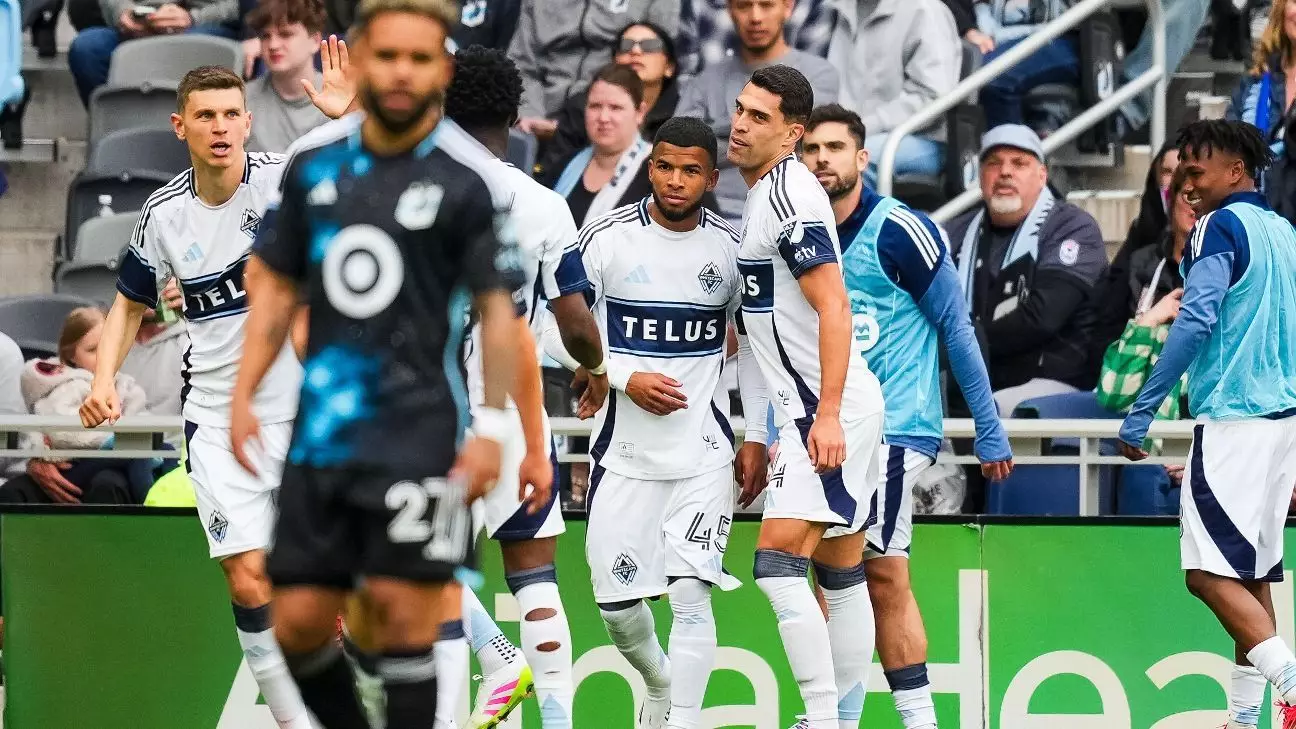In the high-stakes environment of Major League Soccer (MLS), tensions often run high, both competitively and emotionally. This is especially true in the recent match between Minnesota United FC and the Vancouver Whitecaps, which culminated in a disturbing social media storm following allegations of a violation of the league’s Non-Discrimination Policy. The incident unfolded in the 95th minute, during a moment when the game—won by the Whitecaps 3-1—was drawing to a close. What transpired highlights a critical need to scrutinize not just what happens on the pitch but also the underlying attitudes that allow such behavior to persist.
Unpacking the Incident
The key players involved were Minnesota’s Joseph Rosales and Vancouver’s Emmanuel Sabbi, who were seen engaging in a verbal spat that escalated dramatically as the clock counted down. Teammates joined the fray, creating a tense situation that did not go unnoticed by the officiating team led by referee Drew Fischer. Although Fischer took steps to address the apparent violation by consulting with the team captains and managers, he ultimately chose not to penalize Rosales. This decision has raised eyebrows—did Fischer lack the necessary evidence to substantiate the claims, or did he simply elect to prioritize continuing play over addressing a troubling incident?
Post-match behavior underscored the emotions of the episode, with reports indicating that Rosales further escalated the situation by pushing a Vancouver player as they exited the field. This isn’t merely a case of raw competitiveness; it raises questions about how deeply enmeshed discriminatory attitudes are in the culture of soccer at all levels, inviting introspection from players and fans alike.
The League’s Response: A Mixed Bag
Following the match, MLS announced it would conduct a thorough investigation into the allegations. This response is crucial but underscores a lingering concern: why does it take incidents like these for the league to engage in self-reflection and promote accountability? The league’s statement conveys that it stands firmly against harassment and discrimination. However, action must speak louder than words. MLS has faced challenges in stamping out discriminatory language on the field, having previously suspended players for similar behavior.
In November 2023, defender Kai Wagner was suspended for three games for directing a slur at a fellow player, and earlier in the same year, Dante Vanzeir received a six-game penalty for a racial slur. These incidents show a troubling pattern but also a potential for change. However, one has to ask: Is punishing players enough, or do systemic issues within the sport require a comprehensive overhaul?
The Path to Change: Education and Training
To address these issues more effectively, MLS has embarked on initiatives with organizations like Black Players for Change and the MLS Players Association to establish a training program aimed at educating players about unacceptable behavior. This proactive approach is commendable, yet questions remain regarding its anticipated effectiveness. It’s essential that players, particularly international recruits unfamiliar with the cultural sensitivities in American sports, understand the weight of their words and actions. But more than education is required—MLS must commit to creating a culture that prioritizes respect over hostility.
The participation of everyone involved in the game—from players to technical staff—underlines the importance of a unified front against discrimination. The aim should be to foster an environment where players feel compelled to speak out against harassment and are empowered to challenge problematic behavior when they witness it. Ultimately, this is not just an MLS issue; it’s a widespread concern across all sports, warranting a commitment from every individual involved.
The recent incident in the Minnesota vs. Vancouver match should serve as a cautionary tale rather than an isolated event. As soccer continues to grow as a sport globally, the celebration of diversity must overshadow the divide created by discrimination. The urgency for change is palpable, and it is now up to MLS and its community to turn this crisis into a powerful catalyst for change. It’s time to uphold values that reflect the best of humanity on and off the field, setting a standard for leagues everywhere to follow.


Leave a Reply